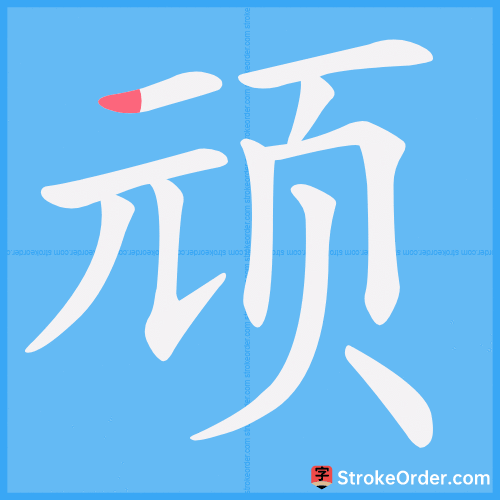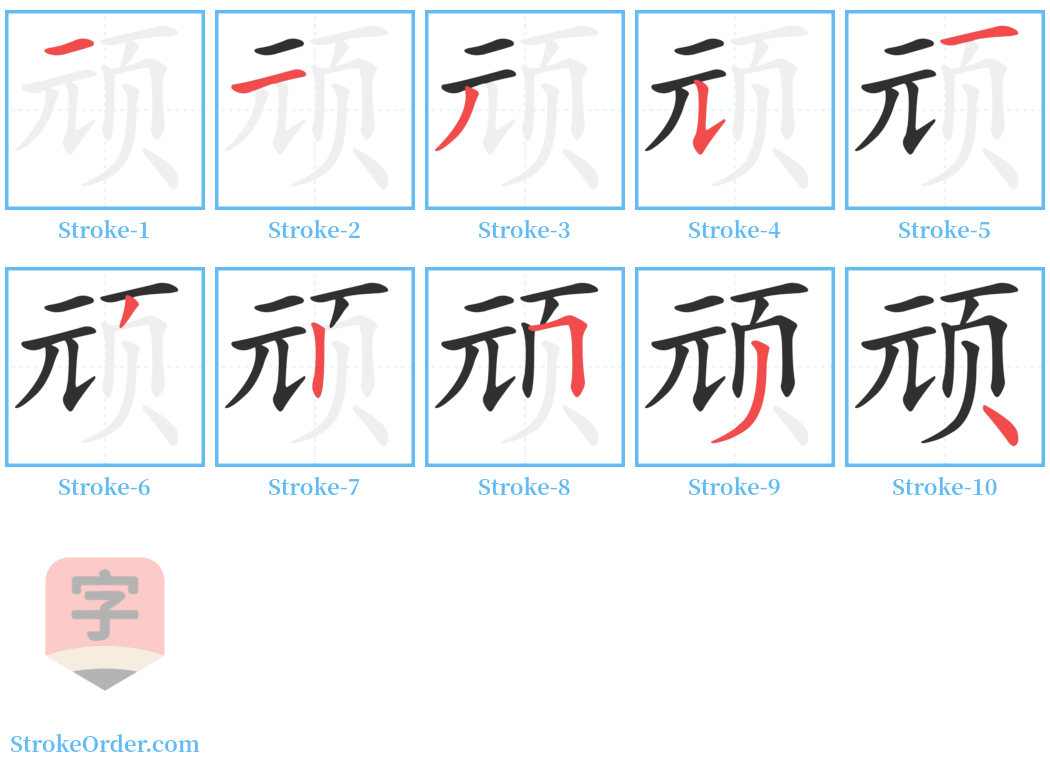顽 Stroke Order
Animated Stroke Order of 顽

Stroke Order Diagrams for 顽

Step-by-Step Handwriting Guide for 顽

Learn to Write Chinese Characters with Video Tutorials
Watch the video of writing the Chinese character "顽", learn the correct stroke order (笔顺) of the character "顽", and master the standard way of writing the character "顽".
Free Printable Handwriting Practice with Stroke Order: 顽
Printable Writing Practice Worksheet of "顽" in Portrait Orientation (Tian Zi Ge)

Printable Writing Practice Worksheet of "顽" in Landscape Orientation (Tian Zi Ge)

Information of 顽
Pinyin
wán
Radical
页
Strokes
10 strokes
Usage
★★★★★
Definition
mischievous / obstinate / to play / stupid / stubborn / naughty
顽 wán
1. Stupid; dull.
愚顽: (stupid)
冥顽不灵: (foolish and dull, unable to respond).
2. Not easily changed or swayed.
顽固: (stubborn)
顽强: (tenacious)
顽敌: (unyielding enemy)
顽症: (chronic condition)
刁顽: (crafty and stubborn)
负隅顽抗: (defend obstinately).
3. Mischievous; naughty.
顽皮: (naughty)
顽童: (mischievous child).
4. Same as 玩 (to play).
顽 wán
[名] (noun)
【本义】: Difficult to split log.
【造字法】: Phonetic-ideographic character, composed of the radical "頁" (yé) and the phonetic component "元".
1. Same as the original meaning (log split difficultly).
引:
1. 唐·元稹《画松》: "纤枝无萧洒,顽干空突兀" (Fine branches lack elegance, while the tough logs appear stark).
2. Stupid and stubborn person; diehards.
例: 顽军 (stubborn faction's army).
3. Ferocious person.
引:
1. 唐·李白《豫章行》: "岂惜战斗死,为君扫凶顽" (Do not regret dying in battle, to clear away the ferocious).
顽 wán
[形] (adjective)
1. Extended to mean perfectly round.
引:
1. 《徐霞客游记》: "闻平乐以下,四顾皆土山,而巉厉之石,不挺于陆而藏于水矣" (From Pingle down, surrounded by soil mountains, the steep stones hidden in water).
2. Stubborn; unmanageable.
引:
1. 《国语·郑语》: "顽童穷固" (The stubborn child remains unyielding).
例: 如: 顽算 (to play tricks); 刁顽 (crafty and obstinate); 顽户 (households that owe taxes in ancient times); 顽陋 (stubbornly lowly); 顽竖 (a mischievous boy); 顽躯 (a strong body); 顽猾 (cunning and mischievous).
3. Dull-witted; stupid.
引:
1. 《广雅·释诂一》: "顽,愚也" (Stupid).
2. 《书·尧典》: "父顽" (Father is dull).
3. 白居易《自蜀江至洞庭湖口有感而作》: "疑自苗人顽,恃险不终役" (Suspecting the Miao people are dull, relying on danger without ending their roles).
例: 如: 冥顽不灵; 顽仙 (foolish and ignorant immortal); 顽昧 (ignorant and stupid); 顽疏 (foolish and careless); 顽卤 (dull and slow); 顽贪 (stupidly greedy); 顽恶 (stupid and rebellious); 顽愚 (foolish and slow-witted); 顽鄙 (dull and vulgar).
4. Hard.
引:
1. 《三侠五义》: "蛮兵如此顽皮,非火攻安能取胜" (Such fierce barbarian troops, can only win with fire attacks).
例: 如: 顽皮 (hard and tough); 顽铁 (hard iron); 顽金 (hard metal); 顽块 (hard clay); 顽重 (both hard and heavy); 顽肉 (necrotic hard meat).
5. Coarse and blunt.
例: 如: 顽璞 (raw jade); 顽钝 (not sharp tools); 顽厚 (coarse thickness); 顽朴 (rough and simple); 顽砖 (substandard bricks).
6. Violent.
例: 如: 顽飇 (storm); 顽阳 (scorching sun); 顽徒 (rude and lawless person).
7. Firm.
引:
1. 宋·陆游《示二子》: "耄期尚有江湖兴,顽健人言见未曾" (Even in old age, there is still life in rivers and lakes, the firm-hearted has never been seen).
顽 wán
[动] (verb)
1. Same as 玩 (to play).
引:
1. 《二十年目睹之怪现状》: "拜了拜本州,就到上海去顽了这多少日子" (After greeting this state, went to Shanghai to play for days).
例: 如: 顽耍子 (to play; to roam); 顽不开 (unable to cope); 顽耍 (to frolic; to play); 顽游 (to play; to tour); 顽具 (toys).
2. To be greedy for.
例: 如: 顽涎 (greed; often related to beauty).
顽廉懦立 (to reform greedy people to be honest, to empower the weak to stand on their own).
be set in one's way / incorrigibly obstinate / (This obstinate man) is unteachable. / obstinate and unchangeable
Input Method for 顽
Pinyin
wan2
Wubi
fqdm
Cangjie
mumbo
Zhengma
bdrg
Four Corner
11282
Unicode
U+987d
Same Pronunciation Characters